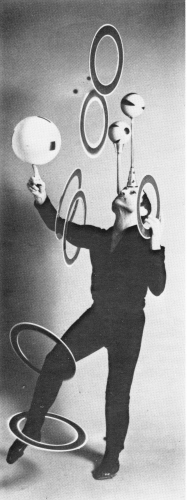
Francis Brunn's finish trick. |
Page 9 Spring 1986
|
Ageless
intensity and devotion After
almost 50 years, Brunn still looks forward
rather than back
Francis
Brunn looks forward to the 50th year of his show business career
with the same ar
Sidelined
from his performances at the Lido in Paris for several weeks last
fall by a pulled muscle in his leg, he released the energy he
normally expends in the show in a Juggler's World interview.
The tone of his speech revealed both satisfaction with his 47 years
as a professional juggler and a desire to accomplish still more with
his artistry.
Brunn's
career demonstrates artistic maturity at its finest. His act has
changed over the years in accordance with his instincts and
capability. He still attacks his work with enthusiasm and care.
Working
with his sister Lotte from 1939 to 1948 in Europe and with the
Ringling circus in America until 1951, he dazzled audiences with
speed and up to 10 rings in performance. But in the late 1950's he
felt a strong pull in a different direction. He went night after
night to watch the performance of a flamenco dancer named Antonio,
admiring the power of his carefully controlled motion and poses.
He
began changing his own act, but as he recalls it, the transition was
frightening. "My new opening was just standing in the
spotlight. I almost started shaking because I wasn't doing anything,
I wasn't moving. It was very hard to go from doing all these crazy
things to doing nothing, but once I got a feel for it I found it was
more interesting to the audience.
"Previously
in the first two or three minutes of my act I did lots of things and
the audience knew then I could do anything, but it wasn't
interesting to them after that."
He
found the challenge of learning a higher degree of control extremely
stimulating. "One of my new moves was to bounce one ball on my
head, but I did it in such a way that the audience saw the ball move
but not my body. I worked for absolute control over it like I was
inside the ball."
His
act today is designed to mesmerize an audience. "For me silence
is success," he said. "If someone comes backstage and says I
had a good audience I know I did not do well, but if they .say it was
a bad audience I know I've done well. When they don't react at the
moment I know I've made a lasting impression.
"There
is one trick where I am spinning a ball on a finger of my right hand
and holding another on the back of my neck. I roll it down my back and
kick it with my heel over my head to a dead-on balance on the spinning
ball. When I hit it perfectly it's deadly to the audience. They're
speechless. "
Time
and wear-and-tear have taken a toll on this intense artist. "The
injuries have slowed me down," he admitted. Then with a laugh he
added, "Nothing else could have!"
But
rather than retreating to perform simpler material, he has responded
with greater precision in his movement. "I don't think of adding
tricks anymore, but of eliminating things and doing more with what I
already know."
The
serious face he shows audiences is reflected in °his devotion to a
strict training regimen. He
rehearses 90 minutes each afternoon, then 45 minutes again about 90
minutes before each show. During the remaining time before his number,
he puts on makeup and stretches. He has had several operations to
repair injuries, but always resumed practice sessions as quickly as
possible. "Four days after a hip operation in 1976 I started
working on balancing one ball on another on a mouthstick as I sat up
in the hospital bed," he recalls.
Another
bad time was the death of his father in 1980. It put him in a deep
depression and prompted him to think about retirement. "But I
didn't know what else to do, I have no other interests," he said.
"I
know every act and every manager in the business, so I could be a
manager but that would be horrible! I could open a juggling school but
I would be a horrible teacher, too! So, I kept working." |

Francis Brunn's finish trick. |